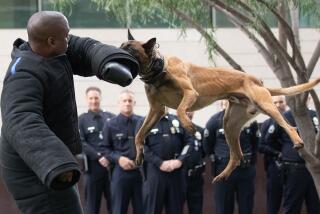Bernd Freytag von Loringhoven, 93; witness to Hitler’s last days in bunker
- Share via
Baron Bernd Freytag von Loringhoven, a former German army officer who assembled the military intelligence for Adolf Hitler’s daily briefings in the Berlin bunker where the German dictator spent his last days before committing suicide in 1945, has died. He was 93.
Von Loringhoven died of natural causes Feb. 27 in Munich, Germany. His death was confirmed this week to the Associated Press by Wolf Jobst Siedler Jr., publisher of Von Loringhoven’s recent book “In the Bunker With Hitler.”
A career army officer who had served as a tank commander before becoming an assistant to the German army’s chief of staff, Von Loringhoven was among Hitler’s top advisors and members of his entourage who sought refuge in the multi-room concrete bunker beneath the garden of the old Reich Chancellery building.
In the days before the Soviet Union’s Red Army began gathering outside Berlin in late April 1945 in preparation for its final push into the capital, Von Loringhoven later recalled, Hitler had ignored his inner circle’s advice to flee south to Bavaria and avoid the inevitable bloodbath that would befall Berlin.
Instead, the fuhrer chose to remain in Berlin and ordered his armies to continue the fight to the end.
“When I heard this, I was very shaken,” Von Loringhoven told The Times in 1995.
“I knew the military situation,” he said. “There was no question that the Russians would soon encircle the town. I felt that there would be no escape. It sounded like a death sentence.”
As the Soviets moved closer, according to The Times account, the radio transmitter that provided Von Loringhoven’s last communications link with the outside world was knocked out.
With that, Von Loringhoven said, “My military function was over, and I told [army chief of staff Hans Krebs] I had no intention of being killed there, like a rat, in the corridor. I asked to be given a chance either to go and find the fighting troops or else to be given a chance to get out of Berlin.”
Hitler did not object to his escaping the bunker. In fact, Von Loringhoven recalled, the fuhrer sat down with him and two other officers who wanted to escape with him to discuss their options.
It was April 29, the day before Hitler and his new bride, Eva Braun, committed suicide.
“Hitler asked me how I intended to get out of Berlin,” Von Loringhoven recalled, “and I told him there were two possibilities.”
The most dangerous way, he said, would be through the city’s parks, which were filled with Soviet troops; the other way was by boat on Berlin’s Havel River, a route enthusiastically endorsed by Hitler.
“I had the feeling when we talked to him that he had already decided to end his life and that he, as a physical wreck, was envious of three strong young men who still had the chance of getting through,” Von Loringhoven recalled.
He and the two other men waited until dark to make their escape but were greeted outside the bunker by fire from Soviet machine guns 800 yards away. “We had to run for our lives,” he recalled.
The next day, after successfully avoiding Soviet troops, Von Loringhoven was captured in territory held by the British and Americans.
Born into an aristocratic family in 1914 on the Estonian island of Saaremaa in the Baltic Sea, Von Loringhoven moved with his family to Leipzig, Germany, after World War I.
He had planned on a law career. But, he told the Observer newspaper in 2005, “the profession was being taken over by the Nazis,” so he joined the military in 1934.
“The Wehrmacht seemed an honorable career,” he said.
His cousin, Wessel Freiherr Freytag von Loringhoven, a German army officer who helped him obtain an officer’s commission, later provided the detonator charge and explosives for the failed plot to assassinate Hitler in July 1944.
Von Loringhoven, who was not found guilty of any war crimes, spent two years as a British prisoner of war. Only then, he told the Observer, did he learn that the Nazis had murdered Jews “on an industrial scale” and claimed that “we didn’t even know the names of the concentration camps.”
“After the war,” he said, “I had the unpleasant feeling of having served as a combustible, as heating wood, for the adventures of a charlatan. I had served a criminal regime while remaining loyal to my military convictions.”
After his release, he worked for a Munich publishing company before joining the West German army in 1956. He later served for three years as part of NATO’s Standing Group in Washington and retired as a lieutenant general in 1973.
With Von Loringhoven’s death, the last living witness to Hitler’s final days in the Berlin bunker is believed to be the dictator’s bodyguard, Rochus Misch.
Von Loringhoven is survived by his son from his second marriage, Baron Arndt Freytag von Loringhoven, a senior German diplomat.
*
More to Read
Sign up for Essential California
The most important California stories and recommendations in your inbox every morning.
You may occasionally receive promotional content from the Los Angeles Times.










